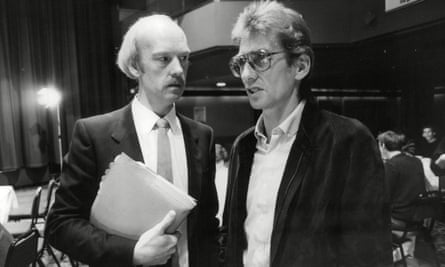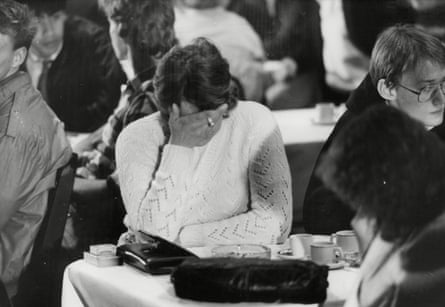One Sunday night in September 1984, between championship darts and the news with Jan Leeming, the BBC broadcast one of its bravest, most devastating commissions. This was Threads, a two-hour documentary-style drama exploring a hypothetical event deeply feared at the time and also somehow unthinkable: what would happen if a nuclear bomb dropped on a British city.
Made by British director Mick Jackson with Kes author Barry Hines, and set in Sheffield, it begins with a young couple, working-class Jimmy and middle-class Ruth, dealing with her unexpected pregnancy in familiar kitchen-sink drama surroundings. International tensions build slowly in the background as the minutes tick by, bursting in through newspaper headlines, radio and TV news, and the ominous words of narrator Paul Vaughan, known then as a presenter of BBC science series Horizon.
Then come CND protests; council officers being summoned to an emergency bunker; and animated films on TV instructing people how to survive. Forty-seven minutes in, a nuclear bomb drops. The film ends more than a decade later with Jimmy and Ruth’s baby, Jane, now an adolescent, giving birth in a world devastated by nuclear winter.
Bringing horror into the homes, shops and streets of a very ordinary world, Threads is a brilliant, terrifying film, and for anyone who has seen it (I watched it in 1999 on a dusty VHS), its effects will have been long-lasting. To mark the film’s 40th anniversary, I have examined its creation and legacy for a forthcoming radio documentary, Archive on 4: Reweaving Threads, 40 Years On, digging into the BBC vaults to show how the film has influenced writers, politicians and fans (including Jim Jupp of the brilliant Ghost Box record label, who has created an exclusive soundtrack for the programme).

The BBC has shown Threads only three times to date: in 1984; in August of the following year, to mark the 40th anniversary of the bombing of Hiroshima and Nagasaki; and as part of a cold war special on BBC Four in 2003. Another – timely – showing is planned for October. When I watched the film at the end of the 20th century, Threads felt like a piece of history. Today, in a world of conflict in Russia, China and the Middle East, and expanding nuclear capabilities, it no longer does.
In a light-dazzled sunroom in Santa Monica, California, Mick Jackson, director of LA Story and The Bodyguard, is remembering the film of which he’s most proud. “You know that on the Internet Movie Database, at the end of each entry for a film, there’s a space for people to write their own comments? I’ve checked that page for Threads practically every year. It varies with the state of tension in the world, but regularly there are [new] entries there saying: ‘I saw this as a kid sitting around the door when I was supposed to be in bed’, or ‘I came to this because people had talked about it and it’s the most horrific, sobering thing I’ve ever seen’.” The latest reviewer, jotchy-14285, posted in June, saying: “Just watch it people, judge for yourselves and hope that the ones with their fingers on the buttons have seen it as well…”
A science documentary-maker in his early career, Jackson joined the BBC in 1966, soon after the corporation decided to ban another film it had commissioned about the effects of a nuclear bomb: Peter Watkins’s The War Game. Blending documentary, newsy vox pops and a cast of amateur actors and extras, it was dropped from the schedules following advice from the Home Office, but later won the 1967 best documentary Oscar after a cinema release. “So I entered a corporation where everybody felt a great deal of shame, that the BBC has somehow betrayed them,” Jackson says.
By the early 1980s, the atmosphere was more confident. A 1980 Panorama episode, If the Bomb Drops…, presented by a young Jeremy Paxman, leaked a series of government films, Protect and Survive, made in secret in the mid-1970s for broadcast if the worst happened. Producer David Darlow convinced a local government commissioner to show them to him, despite their status as state secrets, and editor Roger Bolton took the gamble to include them.
The films became instantly – and chillingly – notorious for how hopelessly ineffective their advice was. Using simple, childlike illustrations, they instruct the public how to make shelters out of mattresses and bury family members outside in the event of a nuclear attack. One of these films plays in Threads on Jimmy and Ruth’s TV as they try to decorate their new flat, the first in a swathe of government responses that are simply not enough.
Inspired by this Panorama, Jackson buried himself in textbooks, papers and conferences, finding out in rigorous scientific detail what could happen in the advent of nuclear war at a time when cold war tensions were ramping up. In 1982 – the year a tactical missile wing was opened at RAF Greenham Common – he made a successful documentary on the subject, A Guide to Armageddon, for the BBC science show QED – but knew that drama would help propel messages to the public more effectively.
Jackson recruited Barry Hines to write the screenplay. My radio producer, Leonie Thomas, found archive footage of Hines talking on Pebble Mill at One about his first meeting with Jackson. “I considered it very seriously,” he says, in his soft South Yorkshire accent. “[And] because I write about contemporary social issues, I thought I ought to have a go at this because it’s the most important of them all.”
Hines, who died in 2016, grew up in Hoyland, near Sheffield, which appealed to Jackson for a location. Why? “Because it was an industrial centre, a Nato base,” says Jackson, “and, excuse the phrase, bang in the middle of Britain.” It helped that the leftwing city council, then run by David Blunkett, was amenable to the BBC’s crew. The area was also a hotbed of CND activism and had local people more than willing to be extras.

Threads was made in only 17 days in early 1984 with a budget of £250,000. By setting it in Sheffield, Jackson provided viewers with a familiar, relatable backdrop. When I saw it, by which time it had the status of a cult film, it reminded me of my home town, Swansea – similarly rebuilt after the second world war. I recognised the people drinking in dimly lit pubs, panic-buying in familiar corner shops, running amok outside Debenhams and Woolworths as sirens wailed their four-minute warning.
This scene takes place in Sheffield’s the Moor, still a shopping district, and still largely unchanged. I recently visited that spot, standing where an image of a mushroom cloud appears in the city centre sky. The same mid-century concrete buildings and church in the distance frame that view. Threads continues to haunt Sheffield and it still haunts me.
In 2018, Charlie Brooker talked to Kirsty Young on Desert Island Discs about watching Jackson’s QED film and Threads as an adolescent. “I remember watching these things and not being able to process what that meant – not understanding how society kept going; why people bothered going to work and feeding ducks and getting on buses and weren’t just weeping and screaming.”
The morning after Threads was broadcast, Neil Kinnock, then leader of the Labour party, wrote to Jackson and Hines to praise them – a letter he reads again for Archive on 4 from a chair in his living room 40 years later, and that Jackson has framed on his Santa Monica sunroom wall.
It ends: “This story must be told time and time again… Don’t, by the way, be troubled by the possibility that some people might be inured to the real thing by seeing horrifying films. The dangers of complacency are much greater than any risks of knowledge.” I ask Kinnock how it feels to read it now. “I’d stick by every word, I think,” he says. “The dangers of complacency are lethal.”
He watched Threads with wife, Glenys, son, Stephen, then 14, now a Labour MP, and daughter, Rachel, 12, now an ITN producer (“It did affect them,” Kinnock admits). He rewatched the film before our interview, and was struck by “how brave and truthful it was”. But did it change government conversations at the time? “None,” he said, bluntly. “It didn’t shift policy at all.”
But films such as Threads can still have an impact, he says – he cites Mr Bates vs the Post Office as another production that directly challenged people in power. “A film can shift opinion by enhancing understanding, and when a democracy becomes conscious of injustice, that makes an important contribution to public comprehension.”
For Jackson, the message of Threads comes down to something very simple: trusting people with the truth. “That’s what I wanted to get across,” he says. “That there’s no going back, that this happens. You can’t go back and press replay.”
But with a film you can. This month, Russian deputy foreign minister Sergei Ryabkov hinted at his country’s intention to change its stance on the use of nuclear weapons “connected with the escalation course of our western adversaries”. The UK and the US recently enhanced their nuclear cooperation pact. Threads airs on BBC Four next month. Be brave for two hours, and then continue the conversation.
-
Reweaving Threads, 40 Years On is on Radio 4/BBC Sounds, 21 September at 8pm
Source: theguardian.com





















